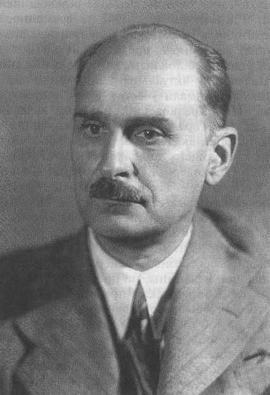Konrad Nickolay (1891–1970) – Russian orientalist, specialist in Lapanese and Chinese studies, ethnographer, specialist in cultural studies, philosopher of history.
In 1912, he graduated from the Oriental Faculty of the St. Petersburg University with the specialization in Chinese and Japanese languages. He was trained in Japan in 1914-1917. In 1922-1938, he was Head of the Chair of Japanese language at the Leningrad Institute of Living Oriental Languages, taught at the Chair of Japanese language at the Petrograd/Leningrad University, worked for the ‘Vsemirnaya literatura’ Publishing House (World Literature); in 1930-1938, he was Head of the Japanese Cabinet of the Institute of Oriental Studies of the Ac. of Sc. of the U.S.S.R. In 1926, he became Professor; in 1934, he was elected for Correspondent Member of the Ac. of Sc. of the U.S.S.R.; in 1958 – Academician of the Ac. of Sc. of the U.S.S.R. In 1938, he was arrested with accusations in espionage; after a year of hard works in a camp he was transferred to a close institution of the jail type to translate from Chinese and Japanese. He received freedom on September 8, 1941, after his case was reevaluated, After it, he got a position of Professor of the Chair of Japanese language at the Moscow Institute of Oriental Studies; since 1943, he worked at the Institute of Oriental Studies of the Ac. of Sc. of the U.S.S.R. in Moscow. In 1969, K. was one of the first specialists in Japanese language and culture, who was awarded with the Japanese Order of the Rising Sun.
The research activity of K. was characterized with his strong interest to the searches for some universal forms of the world historical evolution. Studying the spiritual culture of the peoples of the Far East, he used the comparative method and tries to put aside cultures of West and East; he build a conception of the ‘Oriental Renaissance’ which gave a chance to reevaluate the input of eastern cultures into the world heritage.
Materials collected during his visit to Korea (since 1910 – a Japanese colony) are of special interest. The expedition was organized by the Russian Committee for Studying Middle and Eastern Asia in 1914-1917. In the course of his travels, K. made notes on folklore, descriptions of 21 temples, gathered samples of epigraphy, questioned local people, visited Shamanic ceremonies, regularly fixed his impressions and data into his diaries. The results of the expeditions were systematized by him in the work ‘Essays on the Social and Spiritual Culture of Koreans at the Edge of the Nineteenth – Twentieth Centuries’ published in 1996 only. Thus, his unique field materials reflecting the lost cultural layers of religious ideas and rites of Koreans, including the rites of pass

